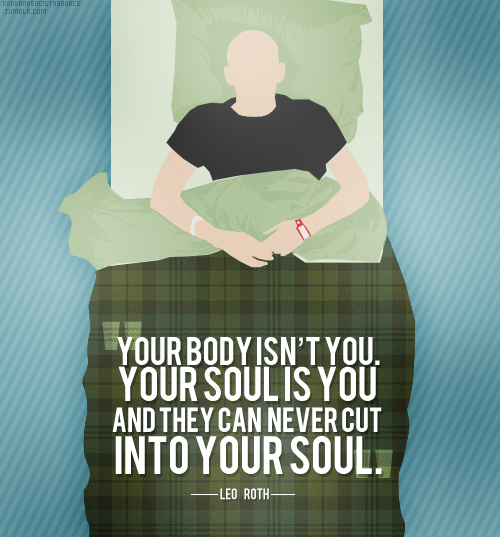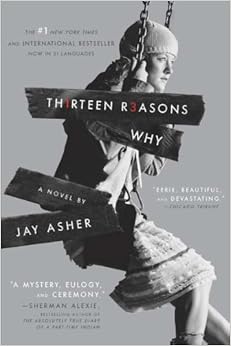This girl today was telling me about how her English class were doing their orals based on the theme 'Coming of Age' and I guess you could categorise the books I've been reading lately under that general heading. As you probably already know, the jump between the lengths of the third
Harry Potter book and the fourth go from short and sweet to long and increasingly complicated. So after enjoying the tedious journey through
the Goblet of Fire I decided to take a break by reading some teen book, and never really got back to it. I
will return to the fifth book after finishing my current book though - don't you worry.
I've seen a change in my book and movie choices lately, from revolving around chick flicks and rom coms to focusing on more relatable aspects of life - because in case you haven't noticed, there's not a lot of love going on in mine. Although the majority of the texts we read, hear or see nowadays depict a romantic relationship as the centre of life, I think we need to realise all the other more important individual aspects as well, because friendships and personal feelings are way more complex than what we deem as 'cute couples'.
Even in Paradise - Chelsey Philpot
The second YA (young adult) book I read -I think?- was this one about Charlie, an all girls' private boarding school girl, who falls in with this classic John Green character-type, Julia. Julia's family is dazzling, larger-than-life, mysterious, adventurous, owns this palatial beach house, and contains her hot brother, Sebastian.
If I remember correctly, Charlie gets so deep into Julia's life that she begins to neglect all her previous friends. She doesn't seem to care either. It's like she's dumped them for someone she deems as better and they're not good enough anymore. In some ways, I feel as if she wanted to be more like Julia, go on adventures like Julia, be rich like Julia, and I also understand how easy it can be to see people who have qualities you wish for, and immediately think they're worth more somehow. I know it's horrible to neglect your friends, even when there's all those quotes about surrounding yourself with people who are already who you want to be. I just reckon that while it may be easy to get caught up with certain people, the friends you're close to always deserve all your respect and attention, or at least some sincere apologies if you stuff up.
But then, I read this article today where the writer said something about how as you grow up, you stop seeing your friends in this hierarchy from closest to less-close, and you begin to see them as separate relationships or just influential beings of sorts. Maybe once I start seeing people as names rather than closeness ratings, all these 'ethical friendship dilemmas' won't apply anymore.
Charlie was also this artsy sculptor character who kept this memory box throughout the whole book. At the end of the book she uses all the little memory trinkets - sea shells from the beach house, the rock from her first encounter with Julia - to make this sculpture, and I just think that's so cool. Memories are the most influential things, and turning them into a piece of art would actually represent something real.
There was also this quote: "You don't judge people do you, Charlie? You just kind of watch them." (p148) and it epitomises how much I liked her character.
13 Reasons Why - Jay Asher
I've read the blurb of this book quite a few times over the last few years, but I never picked it up because I thought it seemed too depressing or boring or not cute enough. After a friend recommended it though, I thought about it some more and even went through the trouble of buying it rather than borrowing it. That just goes to show how much other peoples' opinions can impact mine, even though it was definitely worth it.
The book is written in the point of view of Clay, about a girl named Hannah Baker who commits suicide and leaves tapes describing the thirteen reasons why she did it. The reasons go over many different aspects of high school and friendship and respect, and to be honest, I reckon Hannah was incredibly stupid at many points throughout her story and Clay knew it. It was like she was just searching for reasons to die, instigating them, and then finally acting upon it.
It's crazy how rumours can spread, how they can go from something seemingly innocent to something warped by other peoples' opinions. The thing is though, when you do something you think honestly won't matter, even when people begin talking about it, it still doesn't really. People talk about other people and what they do daily as a way of small talk, or as just another conversation. It doesn't matter to them, but if it's about you or something you're part of, it seems so much bigger than it really is. And while these may be seemingly meaningless conversations, they still impact how people think of you and your reputation, and therefore how people treat you.
Hannah writes all this 'bad poetry'. She goes to this garden cafe and writes her feelings in incomprehensible semi-sentences in her notebook. She talks about how people change for other people, and how daunting it is to sit in the diner where everyone hangs out alone. One of the people who constitute as a 'reason why' is the publisher of this lost and found zine, filled with the things he finds on scrap pieces of paper people leave lying around the school. While what he publishes by her isn't right, the idea just seems appealing.
Never Sometimes Always - Adi Alsaid
This one's about an 'artsy' pair who want nothing but to go through high school originally. As freshmen they write this 'nevers' list of all the cliches they refuse to do throughout high school, and at the end of their senior year they decide to do them all.
I just love the 'artsiness' of it all. They people-watch on this bench at this beautiful harbour, the girl dyes her hair pink, they take a road trip to watch some indie band (this was actually a cliche), they build a treehouse in the middle of the night at school, they bring cupcakes to a notorious party house, the girl recites an inappropriate slam poem as a joke.
I dog-eared quite a few pages in this book and here are some quotes I'll share from them:
I start thinking about exactly that: how people can edit a thought before sending it out into the world. They can make themselves seem more well-spoken than they are, or funnier, smarter. I start thinking that no one in the world is who they say they are, then my mind goes to how I also edit myself, not just online but in real life, except for those real instances like right now where I'm ranting - even though that's a lie because I've had this train of thought before and damned if I didn't tweak it in my head a few times to make it sound better - and then my mind starts racing so furiously I can't control my thoughts, and I start thinking about robots and wondering if I'm even a real person. Then I have to watch cartoons to shut my brain off. -p81
I know it's weird to even say or think this, but that book has made me who I am... But certain lines felt like they were thoughts I'd had my whole life that just hadn't taken shape until I read them. 'A little better than you found it' is how I see everything now. Not just the world, but everything. People, too. I want people I know to be a little better off than when I found them. -p111
'How's your day been?' Julia always hated the question. It had always felt to her like a question asked between people with nothing else to say -p236
It was lazy. Love was lazy as hell. Love laid around in bed, warm from the sheets and the sun pouring into the room. Love was too lazy to get up to close the blinds. Love was too comfortable to get up to go pee. Love took too many naps, it watched TV, but not really, because it was too busy kissing and napping. Love was also funny, which somehow made the bed more comfortable -p229
Memoirs of a Teenage Amnesiac - Gabrielle Zevin
This is the book I'm currently reading and it's basically about this 17 year old girl who loses her memories from the last 6 years.
It's haunting the way she wonders why she's friends with the people she's friends with. When she asks her real best friend why she even likes her boyfriend, he tells her honestly that it's because she likes being seen with him, the same way she likes being seen with her 'friends' in the cafeteria, who she realises she doesn't enjoy the company of. It's crazy how being seen in certain ways can affect how we spend our time, and I'm trying to make my actions more genuine than to have anything to do with reputation.
She's also the co-editor of her school year book, and when she asks her best friend why she likes it, he says it's because the year book is what people refer to in the past and the present. When you're young, you look at the people in the Yearbook to see who you aspire to be, and when you're older the Yearbook is what you take out to remember that time: the people, the activities, the school year. So the Yearbook is basically a community memory bank, something people truly do refer to, an impact on reputations and school and the creator of nostalgia.
Reading this made me think of my own failures at becoming the sub-editor (and then editor) of my own school's yearbook, which I found out about earlier this week. Sure I was disappointed, but at the same time, the girl who did get it deserves the position just as much as me.
...
I reckon we gain so many ideas from reading books without knowing it, and there are also so many books I've read in the past that have had a huge impact on my worldview, and so many I would love to reread to fully appreciate this time round.
I think it's time I got my life sorted out, so that the only problems I have are the ones happening to the characters in my books.
Love,
M





